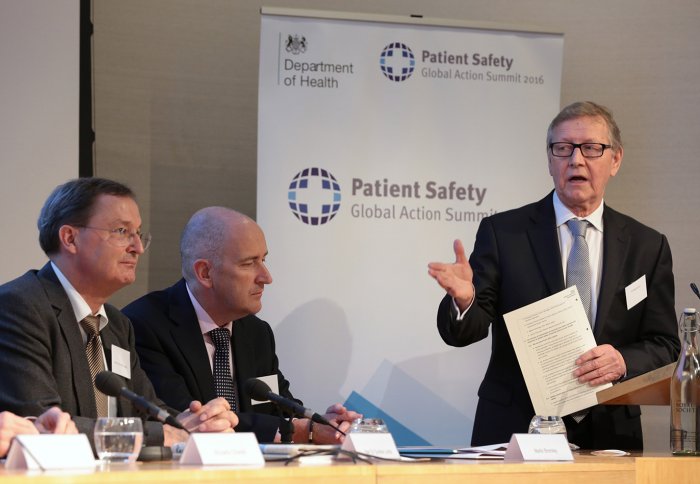

During Patient Safety Week, experts from NIHR Imperial PSTRC teamed up with UK government to create a global movement to transform patient safety.
The saying goes: “you cannot know where you are going unless you know where you have been.” The same applies to health systems.
At the Patient Safety Global Action Summit last month, the global health community, led by the Dr Margaret Chan - the Director General of the World Health Organization, Jeremy Hunt MP - the UK Secretary of State for Health, Professor the Lord Ara Darzi - Director of the NIHR Imperial Patient Safety Translational Research Centre (PSTRC) and seven health ministers and ministerial delegates from 12 other health systems gathered in London to kick-off a global movement for patient safety, which aimed to jump-start coordinated global action to reduce avoidable harm caused to patients by the health services.
While patient safety – as a focus of health service research and a priority for policy makers – surfaced nearly 17 years ago around 1999, the Summit last month brought the discussion to new heights. Perhaps the sense of palpable, renewed energy was due to the presence of new members – health systems, including the likes of Oman and China, which have focused largely on expanding basic healthcare access up to now – pledging resources and political will behind making care safer. Or perhaps it was because attendees had a clear sense of the direction of travel, having spent the previous day steeped in discussion on what we know to have worked in our journey so far.
Patient safety
It’s a truism that as a policy item, patient safety ticks off all the necessary moral boxes – after all, we are all users of the health service. On the other hand, large-scale policy solutions are difficult given how complex healthcare is and how heterogeneous the root-cause may be. Up to now, we’ve had many small-scale wins – for example, reducing pressure ulcers, rates of MRSA infections and falls within certain settings of care – while other much larger, systemic challenges lurk beneath the surface.
This is not to say that we’ve not made any progress at all in the past two decades. For that matter, here in the UK, we’ve made the political choice to funding much-needed research on patient safety. The National Institute for Healthcare Research (NIHR), co-host of the Summit and under the leadership of Professor Dame Sally Davies, CMO to Her Majesty’s Government of the UK, has funded translational patient safety research since its establishment a decade ago.
Via research, much of what we know to ‘work’ in patient safety proves to coalesce around several themes – the need to foster transparency and a learning culture; to empower leadership at the top and throughout the health system; patient, staff and public engagement; performance measurement; and a systems, rather than siloed approach, to improving safety.
Many of the above themes were captured in the report Patient Safety 2030, produced by the NIHR Imperial PSTRC, and were discussed at the Expert Summit of the Global Action Summit, which took place on March 9th, hosted by Professor the Lord Ara Darzi. Leading experts in the field, including Dr Victor Dzau, President of the National Academy of Medicine, Dr Don Berwick, Professor Emeritus of the Institute of Healthcare Improvement, and Dr Tejal Gandhi, President and CEO of the National Patient Safety Foundation, and Professor Dame Sally Davies joined to reflect upon what they have learned in their storied careers. Also in attendance were well-respected experts in and outside of the healthcare sector. Dr Jennifer Dixon, CEO of the Health Foundation, an independent UK charity which helped to fund the Summit, took part in the first panel, ‘An holistic approach to patient safety,’ where she shared the astonishing figure that since 2011, the UK government has initiated 179 policy interventions meant to improve quality, most of which are related to patient safety.
Outside of the healthcare sector, experts from the nuclear and aviation industry shared lessons on how healthcare can adopt practices from these highly reliable industries.
What’s next?
Professor the Lord Ara Darzi reflected: “the Summit was a tremendous success and certainly a milestone for patient safety, as a field of study, a policy priority for health systems and a fundamental pillar of healthcare.”
The two-day Summit concluded with the Secretary of State for Health, The Rt Hon Jeremy Hunt MP, announcing a series of patient safety measures to encourage a no-blame culture in the NHS. These new measures included a safe space for people to speak up at the new Healthcare Safety Investigation Branch, a learning from mistakes league and the introduction of medical examiners from 2018.
Internationally, a follow-up Summit is planned in Germany in 2017. Furthermore, the first ever Patient Safety Day may be on the horizon later this year. The idea was put forth by the Minister of Health of the Sultanate of Oman and was supported by Dr Chan of the WHO.
Further reading
- Patient Safety 2030 report
- National Reporting and Learning System (NRLS) Research and Development
- Check out the social media coverage of the event via our Storify summary
- View the photos on Flickr
Join us!
We are hosting our monthly Global Health Forum this Thursday 21st April from 5:00-7:00pm at St Marys Hospital in London and the focus this month is on patient safety. Do join us if you can. Further information and registration details can be found here.
Article text (excluding photos or graphics) available under an Attribution-NonCommercial-ShareAlike Creative Commons license.
Photos and graphics subject to third party copyright used with permission or © Imperial College London.
Reporter

Jo Seed
Institute of Global Health Innovation

Contact details
Email: press.office@imperial.ac.uk
Show all stories by this author



